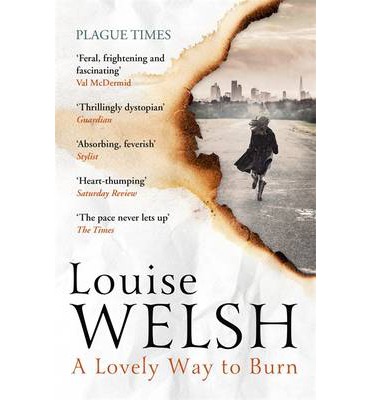
Had enough of the dreaded virus dominating the news?
How better to escape the anxieties induced by living in semi-lockdown, caused by a troublesome new virus, than to read a crime thriller exploring a world in which, erm, a troublesome new virus is wreaking havoc in London? Louise Welsh’s superbly atmospheric novel makes it clear that things could actually be worse – much worse…
What’s it about?
‘A Lovely Way to Burn’ combines two of my absolute favourite kinds of story: a murder mystery and apocalyptic dystopia.
When Stevie’s boyfriend stands her up one evening she wonders idly if their relationship is over. She visits his flat to retrieve some personal possessions, but discovers that she wasn’t stood up at all – Simon is dead. How? Why?
Immediately after returning to her own home, Stevie is stricken by a virus that utterly incapacitates her. When she recovers, she realises that the virus is spreading rapidly, but it’s killing equally rapidly. People are dying and the doctors are powerless. Society is collapsing and only Stevie cares that Simon might have been murdered – Stevie, and the man who’s trying to kill her, in a London that’s falling apart…
What’s it like?
Deeply disturbing. The mundanity of ‘normal’ life is troubled by violent outbreaks before the virus appears: some men shoot each other, some paw and leer aggressively at Stevie, and there’s a feeling that this society is already on the brink of untold but feral terrors.
Welsh’s writing is atmospheric and haunting, especially when Stevie visits a hospital hollowed out by the virus, reminding us that for all the damage a virus can do, nothing is quite as frightening as people who have nothing to lose.
I do most of my reading before bed and genuinely had to take a break from reading this because the nightmarish, ‘all strangers will kill you or do you severe harm,’ vibe was making it hard to get to sleep. This does exactly what a great piece of apocalyptic fiction should do: it makes you cold with the deeply felt knowledge that this, this, is exactly how life could unravel.
Final thoughts
While Stevie spends her days seeking to understand why Simon died, other characters can’t understand her relentless focus on understanding the significance of one death in a sea of agonising deaths and at the potential expense of her own survival.
One woman, learning that her own husband may have been murdered, muses that a week ago such a bombshell would have meant she wouldn’t rest until she found his killer, ‘but the new priority is to stay alive’. By contrast, Stevie, who admits she barely knew her boyfriend, opts to make Simon her sole priority. Why? Perhaps the answer lies in the sudden hollowing out of Stevie’s life: once circumstances have conspired to remove her job, her friends and her apartment, what else does she have? How do we give our lives meaning in extreme circumstances?
More problematic for me was that Stevie never once considers the pleas of others to use her immunity to help find a cure. Given that literally everybody else seems to be dying, often within hours of contacting the sweats, her survival seems to offer a thread of hope, if only she would pause long enough. Then again, in Welsh’s frightening account of the disintegration of civilisation, it’s clear that Stevie’s best chance of survival is to keep running; it seems disturbingly unlikely that any professionals would live long enough to make a scientific breakthrough anyway!
‘A Lovely Way to Burn’ is gripping, alarming and genuinely menacing. I’m definitely planning on seeking out the next two books in the Plague Times series: ‘Death is a Welcome Guest’ and ‘No Dominion’.
‘A Lovely Way to Burn’,
Louise Welsh,
2015, John Murray, paperback
I have previously read and enjoyed Louise Welsh’s ‘The Girl on the Stairs‘.